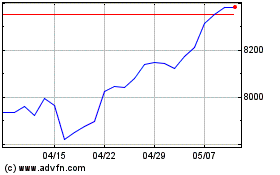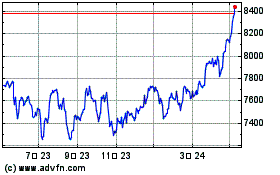LONDON MARKETS: FTSE 100 Drops To 10-month Low In Global Stock Smackdown
2018年2月10日 - 12:41AM
Dow Jones News
By Sara Sjolin, MarketWatch
EU's chief negotiator says Brexit transition deal may not be in
reach at the moment
U.K. stocks dropped for the eighth time in nine sessions on
Friday, setting the FTSE 100 on track for its worst week since 2016
as it tracked a bloodbath for global equities.
What are markets doing?
The FTSE 100 index lost 0.7% to 7,121.73, on pace for its lowest
close since April. For the week, the index was looking at a 4.3%
plunge, which would be its worst since November 2016, when it also
fell 4.3% in one week.
The pound dropped to $1.3817 from $1.3914 late Thursday in New
York, losing ground as the European Union's chief negotiator,
Michel Barnier, said a Brexit transition deal may not be in reach
at the moment
(http://www.marketwatch.com/story/dollar-on-track-for-best-week-since-october-despite-global-market-jitters-2018-02-09).
What is driving the market?
U.K. stocks have slumped this week as part of a wider global
market rout, sparked by sharp losses in the U.S. on Monday, when
the Dow Jones Industrial Average posted its biggest one-day point
drop ever, down 1,175 points. The losses came on mounting fears
that faster-than-expected inflation will lead to more Federal
Reserve hikes this year than currently expected.
After a short respite in the middle of the week, stocks tumbled
again on Thursday in a selloff that saw the Dow lose more than
1,000 points again. U.S. stock were bouncing back
(http://www.marketwatch.com/story/us-stock-futures-rise-as-dow-faces-worst-week-since-the-global-financial-crisis-2018-02-09)
on Friday, helping U.K. and European markets trim their losses.
See:The Dow's down 10%? It's time for some buying, says longtime
bear Doug Kass
(http://www.marketwatch.com/story/the-dows-down-10-its-time-for-some-buying-says-longtime-bear-doug-kass-2018-02-09)
Investors in London were also reeling from a more
hawkish-than-expected inflation report from the Bank of England out
Thursday. The U.K. central bank upgraded its growth outlook and
said it may need to raise interest rates sooner and to a "greater
extent."
(http://www.marketwatch.com/story/boe-signals-swifter-pace-of-rate-hikes-2018-02-08)
Read:A U.K. rate rise in May? Analysts digest hawkish surprise
from BOE
(http://www.marketwatch.com/story/a-uk-rate-rise-in-may-analysts-digest-hawkish-surprise-from-boe-2018-02-08)
The FTSE 100 is highly sensitive to sterling swings as about 75%
of revenues are generated overseas.
What are strategists saying?
"The volatility in equity markets is likely to remain at the
forefront of attention for a while more, as investors try to gauge
whether the correction is over or whether it still has more legs to
run," said Marios Hadjikyriacos, investment analyst at XM, in a
note.
"The lower these indices go, the more attractive they become
from a valuation perspective for investors looking to 'buy the
dip,' a factor that could help to stem the decline," he added.
Which stocks are in focus?
Johnson Matthey PLC (JMAT.LN)lost 2.4% after the chemicals
company's rival Umicore SA (UMI.BT)raised almost a billion euros to
fund further growth.
Direct Line Insurance Group PLC (DLG.LN)rose 2.6% after the
insurer said it expects pretax profit for 2017 to jump on the back
of solid results in its motor and commercial businesses and
lower-than-expected weather claims.
What's new in economics?
U.K. industrial production declined 1.3% in December
(http://www.marketwatch.com/story/uk-industrial-output-hit-by-north-sea-shutdown-2018-02-09),
falling more than expected due to an emergency shutdown of a major
North Sea pipeline.
(END) Dow Jones Newswires
February 09, 2018 10:26 ET (15:26 GMT)
Copyright (c) 2018 Dow Jones & Company, Inc.
FTSE 100
指数チャート
から 3 2024 まで 4 2024

FTSE 100
指数チャート
から 4 2023 まで 4 2024
